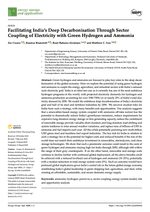This OECD report presents evidence on the expanding scope of automation. After three decades of a secular decline in middle-income jobs, the bulk of low-skilled and low-income workers are now for the first time susceptible to computerization. Meanwhile, skilled jobs remain relatively resilient to recent trends in technology. In particular, workers with extraordinary social and creative skills will still remain in the workforce in 2030.
Future Shocks and Shifts: Challenges for the Global Workforce and Skills Development
24 April 2017
Key Authors
Other Recent Journal Article / Working Papers

Water temperature regulations could help to balance biodiversity and energy security

An aspirational approach to planetary futures

Resolving Uncertainties in the Legality of Wildlife Trade to Support Better Outcomes for Wildlife and People

Protect the Integrity of CITES: Lessons From Japan's IWC Withdrawal to Keep Polarization From Tearing CITES Apart
Controlled Catalysis Delivering High Molecular Weight Polyesters as Recyclable Alternatives to Polystyrenes

Facilitating India’s Deep Decarbonisation Through Sector Coupling of Electricity with Green Hydrogen and Ammonia